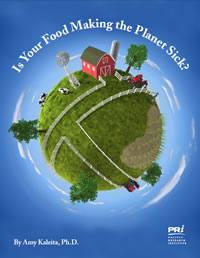Modern agriculture has been blamed for a host of environmental problems, including global warming, water pollution, and ecosystem damage. While growing crops and raising livestock does have significant environmental impact, in many cases the situation has been misrepresented or oversimplified, and some of the proposed solutions have been ineffective or more costly than the benefits derived.
Critics of production agriculture contend that farmers over-apply fertilizers and that is the cause of significant water quality problems. For example, the eutrophication of water bodies, and low dissolved oxygen content, or hypoxia, which is inhospitable for fish and other aquatic life. The agricultural and environmental data on this subject are complex, but the data mount a challenge to the fertilizer contention.
Since 1964 total pesticide use on major crops has more than doubled. Surely this added chemical application is putting our environment at serious risk? Indeed, USGS water testing indicates that more than 90 percent of samples have detectable levels of one or more pesticides. The impacts of pesticides are difficult to assess and few studies have been able to compare the ecological impacts of pesticides to crop protections. Yet, insecticide use is a fraction of what it was in the 1960s and 1970s.
Organic food, touted as good for the earth, can actually be more environmentally risky. Organic farms rely heavily on tillage, consuming energy, and increasing soil carbon emissions, thus making erosion more likely. Organic farms also use pesticides derived from botanical, mineral, and biological sources. Some of them have the same active ingredient and control mechanism as conventional counterparts.
Some charge that eating meat is bad for the environment, as reflected in such programs as “Less Meat=Less Heat” and “Meatless Monday.” In 2006, the UN report Livestock’s Long Shadow concluded that the livestock sector accounts for about 18 percent of greenhouse gas emissions worldwide, including 37 percent of anthropogenic methane emissions, and that it is the largest overall source of water pollution. They noted that global meat production has tripled in the past three decades and could double its present level by 2050, increasing the environmental risk even further.
In the United States livestock production accounts for only 3 percent of greenhouse gas emissions, and reducing consumption of meat won’t have a major impact on reducing climate change. The type of livestock operation – in particular, what and how the animals eat – can have a major affect on the environmental “hoofprint” of meat and dairy production.
A number of federal programs aim to help farmers help the environment. The protection of natural resources, however, has always been secondary and subordinate to Farm Bill objectives, such as farm income support and other budgetary goals. Federal measures also focus disproportionately on issues such as soil erosion, with limited effectiveness. According to the USDA only about 25 percent of the net reduction in soil erosion between 1982 and 1997 could be attributed to government programs. Significant reductions in soil erosion have occurred through unsubsidized conservation practices on land that does not qualify for federal conservation programs. The areas receiving the highest commodity payments, on the other hand, tend to be those with the highest potential for nitrogen export.
To improve the environment while maintaining agricultural production, the federal government should encourage more diversity in farming systems. It should phase out programs that incentivize low-diversity systems. Government funding and programs should promote education on management of high-diversity systems. Federal research and development funding programs should encourage investment in barrier-breaking technologies and farming strategies.
Careful consideration of the data confirms that, contrary to popular contention, our food is not making the planet sick. Environmental policy should be based on sound science, not alarmist simplifications. If they are to help, not hinder, government programs should be outcome-oriented, and not in competition with production.
Agricultural production as currently practiced in the United States is not at odds with a cleaner environment. Outcome-based policy, crafted on sound science, will enable farmers to maintain environmental quality while continuing to provide a growing global population with a high-quality diet.

